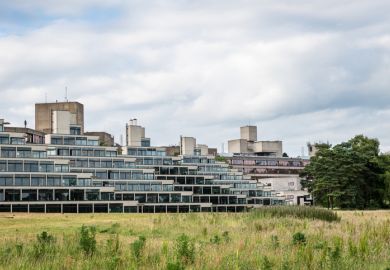A majority of artificial intelligence experts and higher education leaders have rejected the idea that the rise of automation will lead to job losses in universities in the next 10 to 15 years, in an exclusive Times Higher Education poll.
The survey of more than 100 experts in academia and industry, conducted by THE in association with Microsoft, found that 56 per cent of respondents did not expect the size of their administrative workforce to shrink as a result of the rise of AI.
Fourteen per cent of respondents said that they would take on more staff as a result of the development of AI-related technologies. Thirty per cent predicted that administrative staff numbers would decrease by less than a quarter because of AI and only 7 per cent envisaged a halving of such roles – with IT, admissions and student services likely to be the most affected areas, respondents said.
Survey respondents also largely rejected the idea that teaching jobs are at risk of being replaced by AI technology, despite the potential rise of tools such as automated marking programs and robot class assistants.
Seventy per cent of respondents said that they either did not expect redundancies in their teaching workforce as a result of AI advances, or that they expected the number of teaching posts to grow. Just 7 per cent predicted that at least a quarter of teaching staff would be forced out by technological change over the next 10 to 15 years.
Leif Azzorpardi, chancellor’s fellow in computer and information sciences at the University of Strathclyde, said that his institution would potentially take on more people “to deliver better services to students in collaboration with AI”.
“Teaching staff’s duties will certainly change from mundane tasks such as marking to engaging more with students to create unique learning experiences,” he told THE.
Asked what aspects of teaching and learning could never be replaced by AI, many respondents mentioned variations of “human interaction on open issues”, “discussion” and “compassion”. While one expert said that “one day everything can be replicable”, others were more sceptical. “Learning to a large degree is a social process where doing it together with other people is important,” one respondent said.
Nor did respondents, of whom four out of five were university-based computer scientists, believe that AI would lead to university closures: 86 per cent disagreed – most of them strongly – that AI would cause closures, and 94 per cent said that it did not threaten their own institution’s future. However, only 24 per cent felt that their university was optimally configured physically for the age of AI.
Most respondents, however, believed that AI would have a profound impact on how research is conducted over the next 10 to 15 years, with 95 per cent predicting that it would have either a “significant” or “very significant” effect.
jack.grove@timeshighereducation.com
The results of the THE-Microsoft Artificial Intelligence Survey will be discussed at THE’s Innovation & Impact Summit, held at Korea Advanced Institute of Science and Technology (KAIST) in Daejeon, South Korea from 2-4 April 2019.
POSTSCRIPT:
Print headline: Experts doubt AI impact on jobs
Register to continue
Why register?
- Registration is free and only takes a moment
- Once registered, you can read 3 articles a month
- Sign up for our newsletter
Subscribe
Or subscribe for unlimited access to:
- Unlimited access to news, views, insights & reviews
- Digital editions
- Digital access to THE’s university and college rankings analysis
Already registered or a current subscriber? Login







